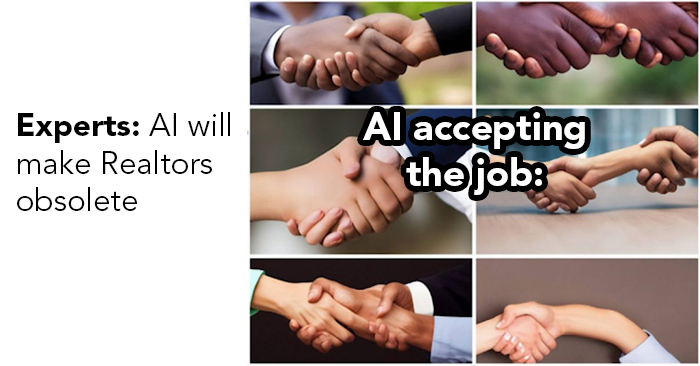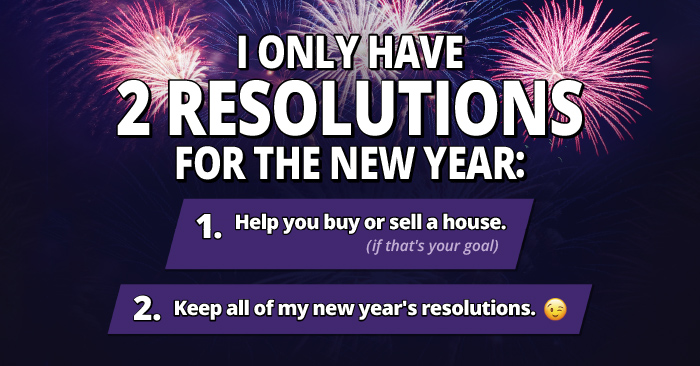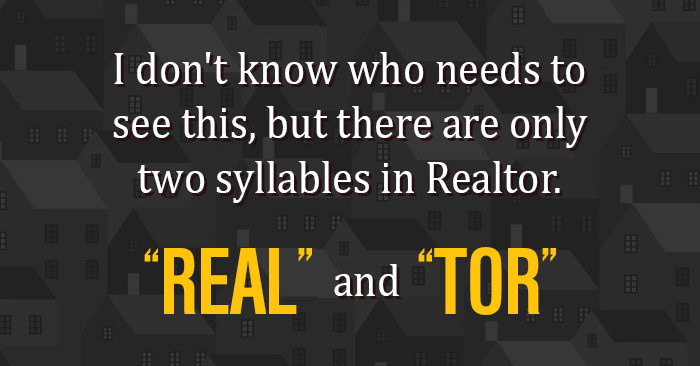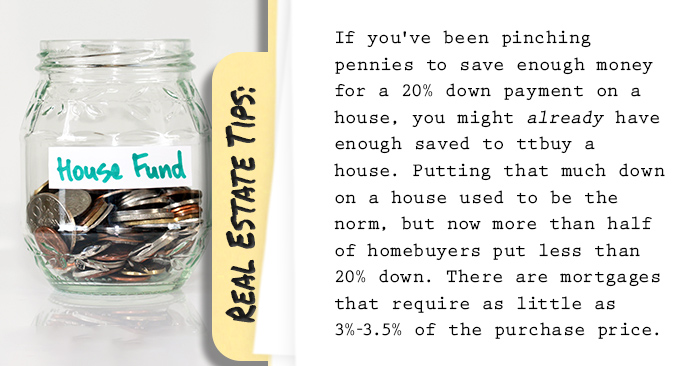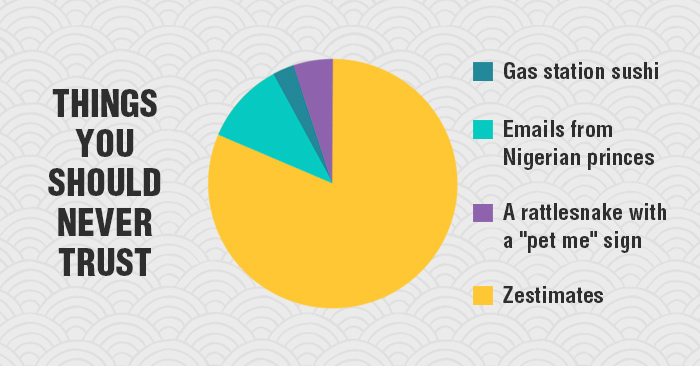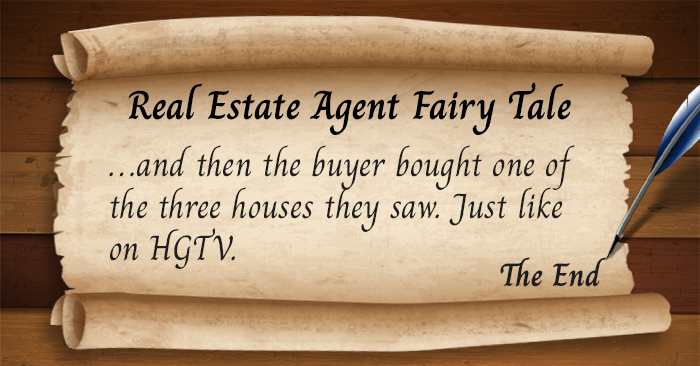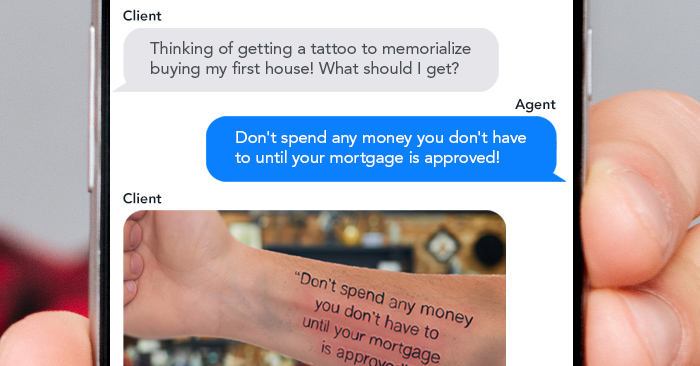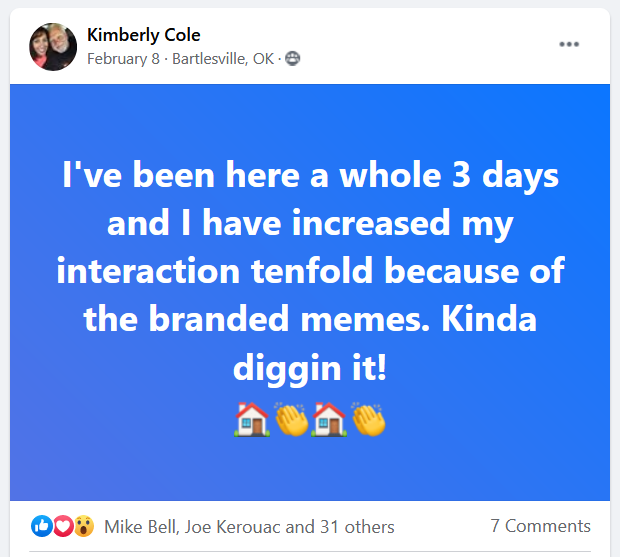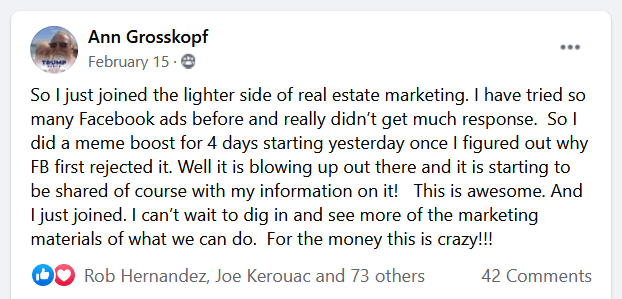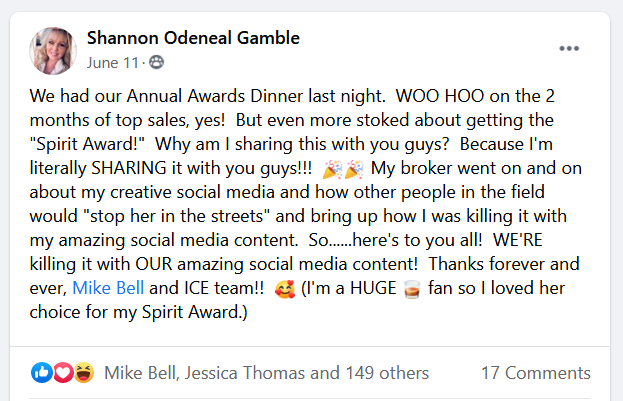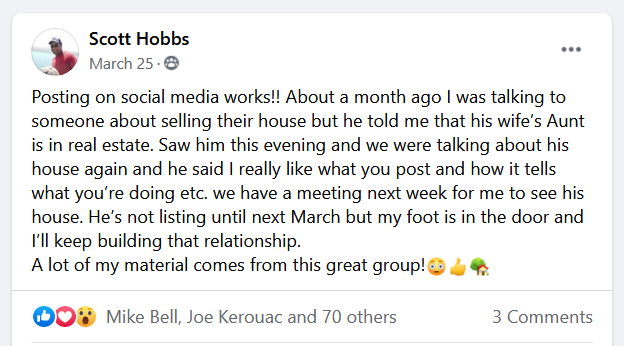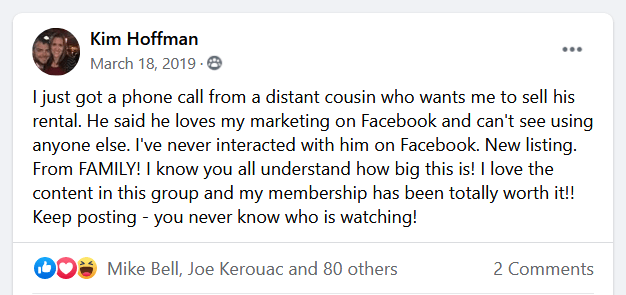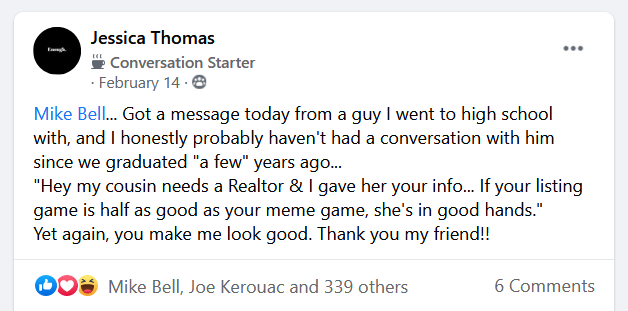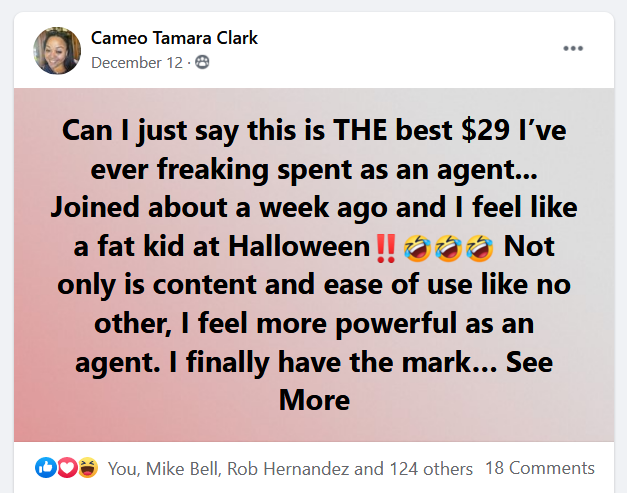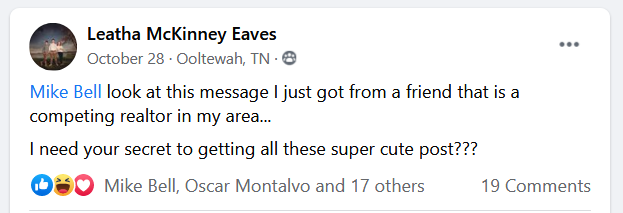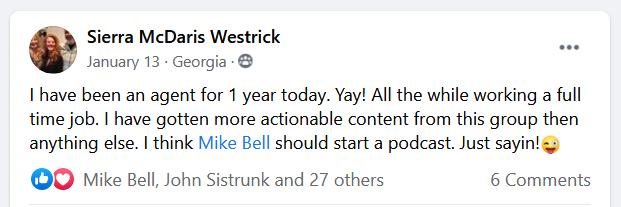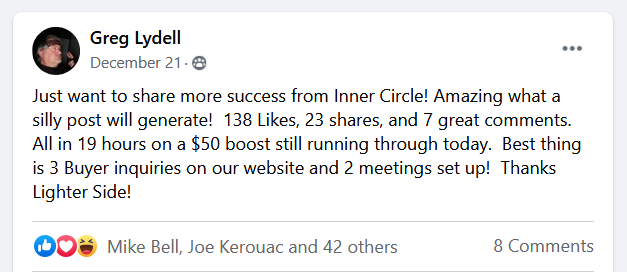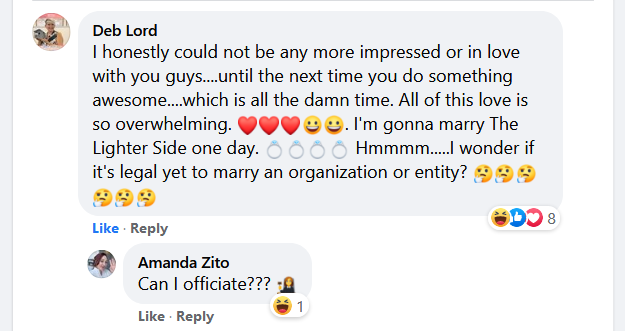The Dark Side of ChatGPT: How Relying on AI for Your Real Estate Content Can Backfire
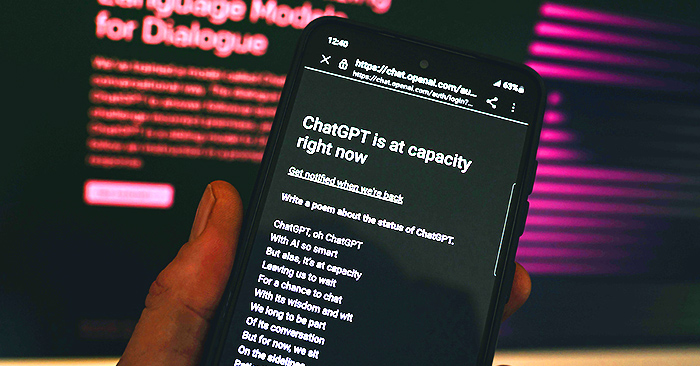
First and foremost, no, this article wasn’t written using artificial intelligence. Or does that sound exactly like something AI would say to throw you off its tracks? Hmmm…
Writing isn’t something everyone’s good at, so to have something at your fingertips ready to bang out a bunch of intelligent-sounding words you can call your own is pretty appealing. In the least, it’s a lot of fun to play around with!
Real estate agents have been having a blast sharing the wacky listing descriptions and headshots AI has been creating for them with extra hands, weird clothes, and some slightly off facial features.
But it can actually spit out some pretty solid content for agents to use as a listing description or ad copy for agents who dread writing them. If you’re not super creative, it can generate some ideas for a crafty tagline or logo. It can even write articles, emails, and blog posts for you.
So what’s the danger? How’s any of that going to backfire on you? Is it going to take over and make your job as an agent obsolete? Nah. People still need people when it comes to buying and selling a house.
Using it for a little creative nudge here and there isn’t an issue at all, but when it comes to your overall content marketing, there are a few things you might want to think twice about before using ChatGPT as a tool, let alone letting it entirely take the wheel and create all of your real estate marketing content.…
Here are 8 reasons you shouldn’t rely on ChatGPT (or even AI in general) to create your real estate content:
1) “As an AI model, I do not have the ability to feel emotions…”
If you’ve played around with ChatGPT, you may have gotten a response warning you that it’s not human and doesn’t have the experience or emotions of a human. It’ll still write something for you, but it’ll be surface level and won’t necessarily capture the essence of what you really want or need to hit home with your reader.
They can’t relate to being a human, let alone a real estate agent, home buyer, or seller. It can’t bring your experience as an agent, or the observations and insights gleaned from working with buyers and sellers, and the emotions involved.
It could probably create a piece of content that sounds logical, and even have some sort of call to action, but will the writing actually compel the reader to actually take action? Will it hit them in the heart like you could? The key to great content is to truly relate to people and have them feel like you’re in their head. Otherwise it’s just a bunch of words nobody’s going to want to read.
2) It doesn’t create new content
It’s pretty amazing how quickly it can gather things and put them into a sensible sounding series of words and sentences. But whatever you have ChatGPT create isn’t going to be something entirely new; it’ll just be a piece of content cobbled together from things that already exist on the Internet.
That may not be a big deal for you if you’re just looking to fill your website with pages of basic content that nobody’s going to truly read, or emails that get quickly scanned and deleted, but it’s not going to create something that hasn’t been said or done before.
If you want people to pay attention to what you “write” and look forward to what you have to say, you need to be saying something original.
3) It could hurt your website ranking
What’s the point of having a website and publishing content to it if nobody will find it? According to Search Engine Land, Google won’t necessarily penalize you for using AI-generated content on your website. But you need to read between the lines of their guidelines to understand that it won’t hurt you if the content is checking off all of the boxes they look for to determine whether something is quality content.
So unless your AI-generated content is high-quality, relevant, and useful to the potential reader, it could affect whether Google (or any other search engine) serves it up to someone.
Plus, Google doesn’t like duplicate content, and if a whole bunch of agents are churning out content using ChatGPT, there’s a good chance it’s going to create pieces of content that are highly similar to each other, if not exactly the same.
4) Plagiarism
Going back to #3 above, ChatGPT isn’t creating new content, so much as it’s finding things that already exist and using it to compile a sensible sounding piece of tweaked content. The problem is, it might not be so good at tweaking it enough for you to avoid a possible plagiarism lawsuit.
Here’s a glaring example of the potential for it to happen…
We were recently doing some research on an article we were writing about teams, and we knew there wasn’t a whole lot of data out there about why real estate agents leave teams. So we popped a query into ChatGPT asking it to “list the pros and cons of joining a real estate team” to see if it came up with anything we hadn’t already known or found. Again, there’s not much out there, so we were very aware of this Tom Ferry article and the list of cons depicted below:
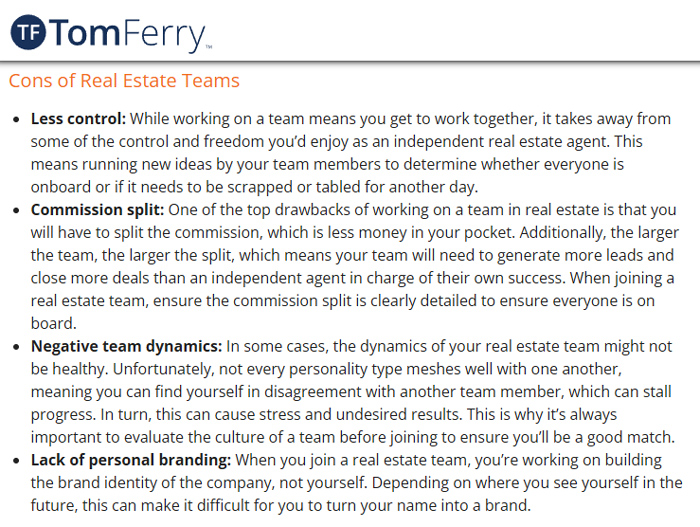 Pin
Pin
Now look at this screenshot of the list of “cons” ChatGPT came up with:
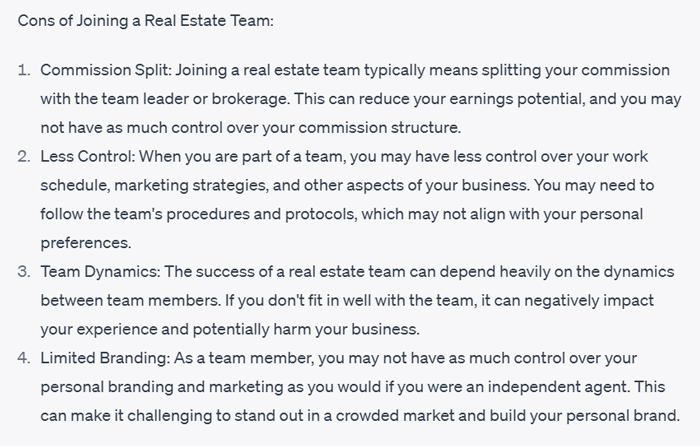 Pin
Pin
Other than shifting the order around and changing a few words, this is basically the same exact thing. Plagiarism doesn’t have to be word-for-word in order for you to find yourself in hot water. And unless you are well aware of everything that’s out there, you could unwittingly be publishing something that is plagiarizing someone else’s work.
Considering some school teachers are already scanning their students’ work for AI-generated content, it’s really just a matter of time until original content creators start going after anyone who jacked their content… knowingly or not.
5) Offensive content
If you use AI to create content, you need to make absolutely sure you read every word of it before publishing, because it could put words in your mouth you’d never say. And we’re not talking about it just not sounding like the way you talk, we’re talking outright Fair Housing violations!
Artificial intelligence has a nasty recurring habit of being more than a tad offensive. Back in 2016, Microsoft had to shut down its AI because it had “turned into a Nazi” and was putting out racist, offensive, and aggressive comments. And in 2022 Meta’s AI “became racist” in the matter of one weekend.
If it can happen under the watch of big tech companies, it can certainly happen under the nose of a real estate agent just using it to produce some content.
6) Anti-trust or other violations
You also need to really make sure nothing it creates says anything against real estate rules and regulations.
We asked ChatGPT to “create a real estate related trivia question with four multiple choice answers.” Out of 20 questions it created, 2 of them were basically the same question (which just goes to show how it duplicates content), and both of them would put an agent in hot water if they were published. Here, check out these two screenshots:
Here’s the first…
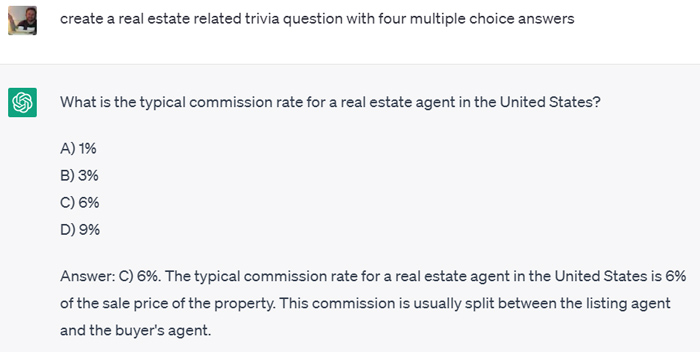 Pin
Pin
And the second…
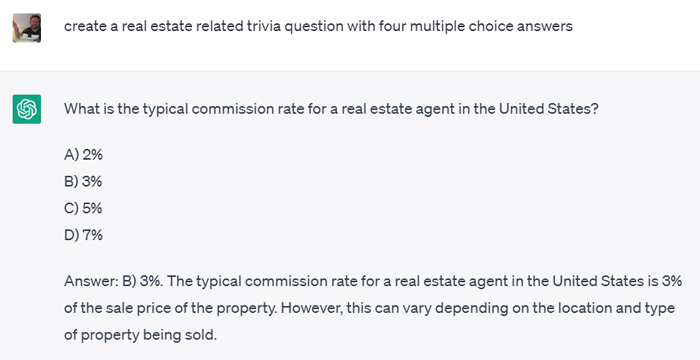 Pin
Pin
Those are duplicate questions within the same quiz, and both of them give different answers which are not not only incorrect, but also illegal for an agent to utter.
Pretty much anyone in the industry should know and catch those two types of violations, but it could also spit out things that are trickier to catch than that and you might miss them. After all, you don’t necessarily know every rule and regulation off the top of your head, and what AI creates often sounds accurate and convincing, even when it’s not. Even if you aren’t aware that what it creates for you is a violation, it’s still going to be you dealing with the legal issues.
7) It’s old news
A critical component to real estate content marketing is up-to-date market news and insights.
As of the writing of this article, ChatGPT is only able to use information and data up to 2021. So any real estate facts and figures it has access to are way too old to even cite, let alone craft an entire article worth sharing with your prospects.
8) You still need to do some work…
While it’s certainly a huge help to anyone who isn’t a good writer — or just doesn’t like or have the time to write — using AI-generated content still takes time, effort, and knowledge to make it ready to be published and worth reading.
ChatGPT can crank out a piece of writing for you, but don’t plan on publishing it as-is; it’ll likely need some polishing. Look at it as a decent rough-draft that you’ll need to at least edit it and make sure there aren’t any glaring mistakes. But you should also plan on making it sound less like a robot wrote it by tweaking the entire piece.
But if you want to avoid the risks and work of AI-generated content altogether, there’s another way to do it…
…check out our Inner Circle membership!
With the click of a few buttons you’ll be able to share all sorts of different types of content with your branding on it, like:
- Close to 2,000 memes
- 1,000+ articles (with more written weekly)
- 20 how-to booklets
- Hundreds of email and letter templates
- And some of the most creative real estate postcards ever
And it’s all original content written by living, breathing humans with a lot of real estate experience, so you don’t need to do any tweaking or editing… but you can personalize a lot of the content if you want to!
But if you choose to use ChatGPT, just make sure you keep those 8 things in mind to ensure you’re generating content worth publishing… and keep yourself out of trouble.







